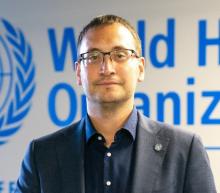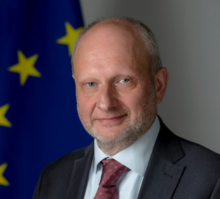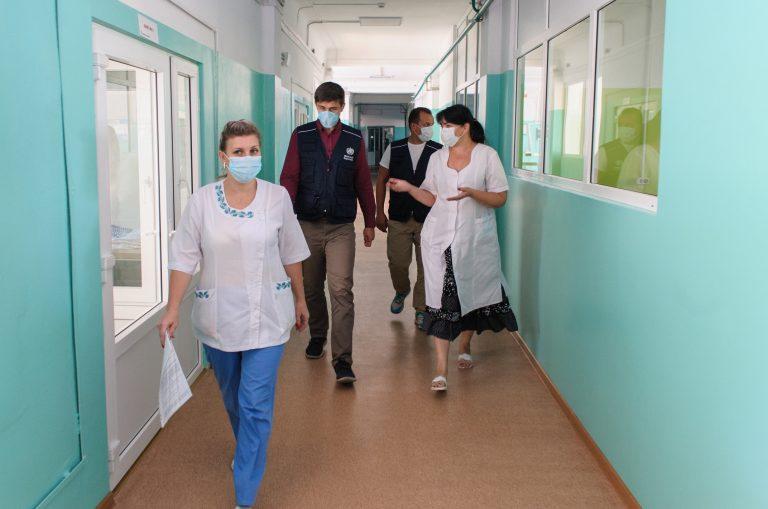Ukraine has acted quickly during the COVID-19 crisis to ensure that people do not have to pay for COVID-19 testing and treatment services. Its recent reforms in health financing played a key role in the process.
Universal health coverage means that everyone can use health services when and where they need them, without experiencing financial hardship. Removing barriers to access is especially critical in a pandemic.
With a stronger health system and a foundation of effective primary health care, the whole population can safely and affordably access essential health services, including services related to COVID-19.
WHO, including through the UHC Partnership, has supported the Ukrainian Government to strengthen health system financing, service delivery and governance for a faster, more effective response to COVID-19 while accelerating progress towards UHC.

“With the COVID-19 pandemic in 2020, it is even more important for WHO to continue supporting ongoing dialogue on the transformation of the Ukrainian health system to ensure the population has better access to health services and medicines."

“The COVID-19 pandemic is a global challenge, which puts health systems worldwide to the test. Working with WHO, and thanks to the UHC Partnership supporting countries in Europe and beyond, the European Union is among the biggest contributors to the Ukrainian response to COVID-19 to strengthen the health system, improve access to high-quality health services and increase financial protection for the Ukrainian population."

"Despite the ongoing fight against the COVID-19 pandemic and the challenges it poses, we are continuing the process of comprehensive health system reform. We are building a socio-economic model of medicine that will help achieve European quality and accessibility of medical services for patients and decent salaries for health professionals.”

“The Ukrainian health system’s main goal is to provide all Ukrainian citizens with equal and free access to quality health services and build a patient-centered model of care. The National Health Service of Ukraine, established as part of the reform, became a critical agent of change, bringing about tangible benefits for access to PHC and other services. The COVID-19 pandemic has galvanized earlier planned reform initiatives aimed at UHC targets."
THE LONG READ
Andrii, a 25-year-old doctor living in the city of Khmelnytskyi in western Ukraine began to feel unwell. It was in March 2020, when the COVID-19 outbreak had started in the country. Armed with medical knowledge, he immediately self-isolated from his wife and other family members. As his symptoms worsened, he called an ambulance, and eventually tested positive for COVID-19 while in hospital.
“While I was in hospital, testing and examinations were free of charge, but I had to find and buy my own medicines. I am very grateful to the anesthesiologists of Khmelnytskyi region and other colleagues who helped me find and buy medicines while my family members were in fourteen-day isolation. Since then, the availability of medicines in hospitals has improved and medicines are now provided to patients free of charge,” said Andrii.
The transformation of health services to ensure that patients can be tested and treated for COVID-19 free of charge is just one of the many positive steps the Ukraine Government has taken. It demonstrates the Government’s commitment to universal health coverage (UHC), ensuring that no one is left behind and everyone can access the health care they need without experiencing financial hardship.
This commitment to UHC has been evident since 2015 when the Government initiated the reform of its health system to improve the population’s health and ensure financial protection from out-of-pocket payments. The reform aims to increase efficiency, modernize an obsolete service delivery system and improve access to better quality of care.
WHO, through the UHC Partnership, has been walking hand-in-hand with the Government since the very first steps on this road. It provided continued and consistent technical support on health financing and service delivery with a strong focus on strengthening primary care, working closely with national and international stakeholders throughout elections cycles and changes in the Government. The Partnership, which assists 115 countries in accelerating progress to achieve UHC, is funded by the European Union (EU), the Grand Duchy of Luxembourg, Irish Aid, the Government of Japan, the French Ministry for Europe and Foreign Affairs, the UK Department for International Development and Belgium.
“Currently, the Ministry of Health of Ukraine is working to ensure that Ukrainians obtain systemic changes in the medical sphere and we have already achieved significant results on this path. Despite the ongoing fight against the COVID-19 pandemic and the challenges it poses, we are continuing the process of comprehensive health system reform,” explained Maxym Stepanov, Minister of Health of Ukraine.
“In particular, our team at the Ministry of Health is carrying out transformation that will change not only the funding system, but also the quality of medical services. We are building a socio-economic model of medicine that will help achieve European quality and accessibility of medical services for patients and decent salaries for health professionals. In recognition of the vital work of health workers to keep our society healthy and safe, we successfully negotiated additional funding to cover a long-awaited increase in salaries for health workers. The Parliamentary Committee on Budget supported the Government’s decision initiated by the Ministry of Health to allocate UAH 5.9 billion [$0.2 billion] for additional payments to medical staff from 1 September until the end of the year [2020],” the Minister added.

COVID-19 in Ukraine
Ukraine recorded its first case of COVID-19 on 3 March 2020. By the end of August, there had been more than 108,000 confirmed cases and over 2,000 people had lost their lives. From the start of the outbreak, WHO has continued to support the Ministry of Health to further develop three key areas of its health system: health financing, service delivery, and governance. This strengthens both the emergency COVID-19 response and progress towards UHC.
“The COVID-19 pandemic is a global challenge, which puts health systems worldwide to the test. Working with WHO, and thanks to the UHC Partnership supporting countries in Europe and beyond, the European Union is among the biggest contributors to the Ukrainian response to COVID-19 to strengthen the health system, improve access to high-quality health services and increase financial protection for the Ukrainian population,” said Matti Maasikas, Head of the EU Delegation to Ukraine.


Health financing – increasing access to health care without financial hardship
Before health system reforms took place, nearly a third of Ukrainian people in need of hospitalization did not use it due to cost. Although the constitution enshrines the right to health and UHC, in practice, access to health services was often limited and many people had to pay for care themselves. As a result, out-of-pocket payments account for a very high share of health spending in Ukraine. The share of households experiencing catastrophic and impoverishing health spending has been among the highest in the European region.
In this context, WHO with support of the UHC Partnership, has played a key role in initiating and supporting transformative health financing reform. From the first days of the reform process, WHO has been in a constant dialogue with the Government of Ukraine and other partners to further advance health financing reform implementation. WHO has been providing technical advice and supporting the National Health Service of Ukraine in ensuring adequate financing was provided to hospitals to ensure all Ukrainians had access to diagnostic and treatment services for COVID-19 caused by coronavirus SARS-CoV-2.
“With the COVID-19 pandemic in 2020, it is even more important for WHO to continue supporting ongoing dialogue on the transformation of the Ukrainian health system to ensure the population has better access to health services and medicines. WHO is maintaining its strong dialogue with the Ministry of Health and national stakeholders as well as development partners to progress with the health care reform’s second phase, which started in 2020. This is crucial to ensure essential services are available at the same time as when we also provide access to COVID-19 consumables as for example personal protective equipment, technical assistance and policy advice related to COVID-19 response,” said Dr Jarno Habicht, WHO Representative and Head of WHO Country Office in Ukraine.

Service delivery – assuring primary health care services
Primary health care (PHC) is the foundation of strong health systems and it is central to COVID-19 response. PHC serves as a critical first line of defense from COVID-19 and to keep people safe and healthy. It can help diagnose, track and stop the spread of local outbreaks while providing essential health services for non-COVID-19 patients.
In May and June 2020, WHO working closely with the National Health Service of Ukraine analyzed the role of PHC in its COVID-19 response and continuation of delivery of basic essential health services. It resulted in a set of policy recommendations focusing on how to further strengthen the primary care response to COVID-19 and restore essential services. WHO continues working with the Ministry of Health and the National Health Service to identify and prioritize the strategies on strengthening the role and capacity of primary care to support COVID-19 response while ensuring maintenance of core primary health services.
“The Ukrainian health system’s main goal is to provide all Ukrainian citizens with equal and free access to quality health services and build a patient-centered model of care. The National Health Service of Ukraine, established as part of the reform, became a critical agent of change, bringing about tangible benefits for access to PHC and other services. The COVID-19 pandemic has galvanized earlier planned reform initiatives aimed at UHC targets. The Ukraine’s health system COVID-19 response consists of a combination of service delivery optimization and targeted the tailor-made flexible funding schemes,” said Oksana Movchan, Deputy Head of National Health Service of Ukraine.


Governance – aligning with public health goals
WHO has been consistently engaged in issues related to governance in the health sector and most recently, intensified its support to the ongoing policy dialogue on decentralization reforms. Ukraine’s decentralized governance means that regions have significant decision-making authority when it comes to health service provision, including various aspects of response to the pandemic. They have the capacity to take proactive approaches that are appropriate for the situation in their areas, such as in developing physical distancing measures, ensuring delivery of essential health services, providing transportation and personal protective equipment to health care workers. To promote more effective implementation of national policies and better response mechanisms at sub-national level WHO together with the Ministry of Health and Public Health Center of Ukraine developed a new tool to monitor public health response measures and epidemiological situation at oblast level.
For example, the Khmelnitskyi Oblast organized an immediate response among regional health care institutions when at least one patient with COVID-19 was detected.
“In particular, about 200-300 people were tested at the same time. Thus, during March-June 2020 it was possible to significantly reduce the spread of infection among organized groups of hospitals,” said Oleg Balashov, Chief State Sanitary Doctor of Khmelnytskyi Oblast.

WHO has been consistently engaged in issues related to governance in the health sector and most recently, intensified its support to the ongoing policy dialogue on decentralization reforms. Ukraine’s decentralized governance means that regions have significant decision-making authority when it comes to health service provision, including various aspects of response to the pandemic. They have the capacity to take proactive approaches that are appropriate for the situation in their areas, such as in developing physical distancing measures, ensuring delivery of essential health services, providing transportation and personal protective equipment to health care workers. To promote more effective implementation of national policies and better response mechanisms at sub-national level WHO together with the Ministry of Health and Public Health Center of Ukraine developed a new tool to monitor public health response measures and epidemiological situation at oblast level.
For example, the Khmelnitskyi Oblast organized an immediate response among regional health care institutions when at least one patient with COVID-19 was detected.
“In particular, about 200-300 people were tested at the same time. Thus, during March-June 2020 it was possible to significantly reduce the spread of infection among organized groups of hospitals,” said Oleg Balashov, Chief State Sanitary Doctor of Khmelnytskyi Oblast.

UHC means health for all
As the world is confronted with one of the most devastating health crises in history, Ukraine’s experience demonstrates the value of reforming health financing, service delivery and governance; the key areas, that set the foundations of health systems in all countries. In both ordinary and extraordinary times, UHC principles are at the core of keeping all communities healthy, safe and productive.

WATCH
People in Ukraine who have recovered from COVID-19 tell their stories
Note: These videos are in Ukrainian language

WHO’s work in Ukraine
Note: These videos are in Ukrainian language
